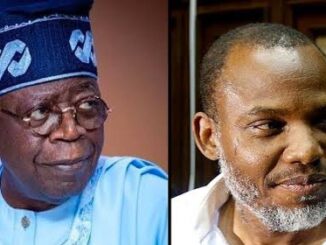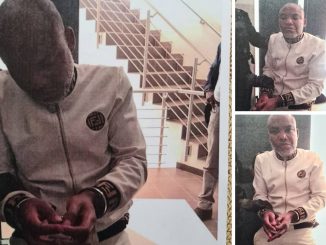
By Marvellous Nyang
November 22, 2025
Uchechi Okwu-Kanu, wife of the detained IPOB leader, has condemned what she described as the secret and shocking transfer of her husband, Nnamdi Kanu, from Abuja to the Sokoto Correctional Centre shortly after he was handed a life sentence by the Federal High Court.
She said she was kept completely in the dark, insisting that neither the family nor any member of the defence team informed her ahead of the relocation.
According to her, the development amounts to “deliberately placing him beyond the reach of his lawyers, loved ones and everyone concerned about his welfare.”
Her outrage came hours after Justice James Omotosho delivered judgment, convicting the separatist leader on terrorism charges and granting the Federal Government the authority to keep him in any correctional facility of its choosing.
Kanu was moved out of Abuja under tight security and taken directly to the Sokoto custodial centre, one of the farthest prisons from his family base in the South-East.
Security sources described the move as a “security-guided deployment” but offered no explanation for why Sokoto was selected above several other facilities.
Lead counsel Aloy Ejimakor confirmed the transfer and expressed concern over the impact on the defence’s work, saying that the relocation places significant logistical and legal hurdles between Kanu and his lawyers.
ALSO READ: IPOB leader, Nnamdi Kanu, gets life imprisonment in landmark terrorism verdict
He hinted at fresh filings to challenge aspects of the post-judgment process, including the choice of custodial location.
Mrs Okwu-Kanu accused authorities of attempting to isolate the IPOB leader, warning that “any action that hides him or restricts his access will only heighten tension.”
Her remarks triggered immediate reactions online, with IPOB sympathisers demanding transparency and civil society actors calling for monitoring of his welfare and access rights.
Officials familiar with the process maintain that the government acted within its powers and followed standard custodial procedures.
They emphasised that detention after a terrorism conviction must prioritise security and order, though they declined to justify the specific choice of Sokoto.
Kanu’s legal team is preparing a series of appeals and procedural challenges.
The Sokoto transfer is expected to become a major point of contention, particularly in arguments over fair-trial rights, access to counsel and the conditions of his confinement.




